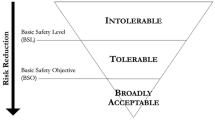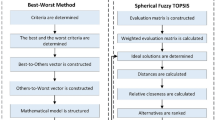Abstract
In order to improve decision-making efficiency about emergency event, this paper proposes a novel concept, i.e., Agile-Delphi Method, which is an integration of agile decision and Delphi Method implicating that the decision-makers instantly deliver, respond, treat, and utilize information via Delphi process while conducting group decision-making about emergency event. The paper details the mechanism of group decision-making about emergency event based on network technology and Agile-Delphi Method. Finally, the paper conducts an empiric analysis taking the “111 event”, i.e., the liquid ammonia spill event happened on November 1, 2006 in a phosphorus chemical company in China, as an example.



Similar content being viewed by others
References
Wang Q, Rong L (2007) Agile knowledge supply chain for emergency decision-making support. Lect Notes Comput Sci 4490:178–185
Tan WN, Xu YC, Xu LD, Zhao XH, Wang L, Fu LL (2010) A methodology toward manufacturing grid based virtual enterprise operation platform. Enterp Inf Syst 4(3):283–309
Busemeyer JR, Pleskac TJ (2009) Theoretical tools for understanding and aiding dynamic decision making. J Math Psychol 53(3):126–138
Zheng X, Liu M (2010) Forecasting model for pedestrian distribution under emergency evacuation. Reliab Eng Syst Saf 95(11):1–7
Georgiadou PS, Papazoglou IA, Kiranoudis CT, Markatos NC (2010) Multi-objective evolutionary emergency response optimization for major accidents. J Hazard Mat 178(1–3):792–803
Levy JK, Taji K (2007) Group decision support for hazards planning and emergency management: a group analytic network process (GANP) approach. Math Comput Model 46(7–8):906–917
Mohammadi SK, Hassanzadeh I, Mathur RM, Patil KV (2000) A new fuzzy decision-making procedure applied to emergency electric power distribution scheduling. Eng Appl Artif Intell 13(6):731–740
Fairchild AM (2006) Decision management: role and effect of using an intelligent intermediary to aid in information sharing. Inf Technol Manag 7(4):249–258
Kauffman RJ, Kumar A (2008) Network effects and embedded options: decision-making under uncertainty for network technology investments. Inf Technol Manag 9(3):149–168
Fryling M (2010) Estimating the impact of enterprise resource planning project management decisions on post-implementation maintenance costs: a case study using simulation modeling. Enterp Inf Syst 4(4):391–421
Rosmuller N, Beroggi GEG (2004) Group decision making in infrastructure safety planning. Saf Sci 42(4):325–349
Yoon SW, Velasquez JD, Partridge BK, Nof SY (2008) Transportation security decision support system for emergency response: a training prototype. Decis Support Syst 46(1):139–148
Belala Y, Issa O, Gregoire JC, Wong J (2008) A secure mobile multimedia system to assist emergency response teams. Telemed e-Heal 14(6):560–569
Kontogiannis T (1996) Stress and operator decision-making in coping with emergencies. Int J Hum Comput Stud 45(1):75–104
Doheny JG, Fraser JL (1996) MOBEDIC—a decision modeling tool for emergency situations. Expert Syst Appl 10(1):17–27
Wang JW, Gao F, Ip WH (2010) Measurement of resilience and its application to enterprise information systems. Enterp Inf Syst 4(2):215–223
Zhang WJ, Lin Y (2010) On the principle of design of resilient systems—application to enterprise information systems. Enterp Inf Syst 4(2):99–110
Landeta J (2006) Current validity of the Delphi method in social sciences[J]. Technol Forecast Soc Chang 73(5):467–482
Doyon LR, Sheehan TV, Zagor H (1971) Classroom exercises in applying the Delphi method for decision-making. Socio-Econ Plan Sci 5(4):363–375
Shefer D, Stroumsa J (1982) Street-lighting projects selection: a rational decision making approach. Socio-Econ Plan Sci 16(6):245–259
Tapio P (2003) Disaggregative policy Delphi: using cluster analysis as a tool for systematic scenario formation[J]. Technol Forecast Soc Change 70(1):83–101
Yang T, Hsieh C-H (2009) Six-Sigma project selection using national quality award criteria and Delphi fuzzy multiple criteria decision-making method. Expert Syst Appl 36(4):7594–7603
D’Mello DA, Ananthanarayana VS (2010) Dynamic selection mechanism for quality of service aware web services. Enterp Inf Syst 4(1):23–60
Wang HJ, Chiou CW, Juan YK (2008) Decision support model based on case-based reasoning approach for estimating the restoration budget of historical buildings. Expert Syst Appl 35(4):1601–1610
Robson N, Rew D (2010) Collective wisdom and decision making in surgical oncology. Eur J Surg Oncol 36(3):230–236
Hakim S, Weinblatt J (1993) The Delphi process as a tool for decision-making: the case of vocational training of people with handicaps. Eval Program Plan 16(1):25–38
Gong ZG, Muyeba MB, Guo JZ (2010) Business information query expansion through semantic network. Enterp Inf Syst 4(1):1–22
Landeta J (2006) Current validity of the Delphi method in social sciences. Technol Forecast Soc Change 73(5):467–482
Steinert M (2009) A dissensus based online Delphi approach: an explorative research tool. Technol Forecast Soc Change 76:291–300
Sankar CS, Raju PK (2001) Use of multi-media courseware to teach real-world decision making skills. Inf Technol Manag 2:443–457
Barua A, Ravindran S, Whinston AB (2007) Enabling information sharing within organizations. Inf Technol Manag 8:31–45
Landeta J, Matey J, Ruíz V, Galter J (2008) Results of a Delphi survey in drawing up the input–output tables for Catalonia. Technol Forecast Soc Change 75:32–56
Zhou Z, Tianshun T (1992) Quantitative method with weight means in the indices of expert optimum-seeking evaluation. Syst Eng Theory Pract 12(1):52–57 (in Chinese)
Xie K, Chen G (2009) Entrepreneurial Team’s risk decision-making process based on group learning. In: International conference on ‘computational intelligence and software engineering (CiSE 2009), 11–13 Dec 2009
Acknowledgments
Project No. 90924010 supported by NSFC; Project No. 2010-JL-22 supported by“the Fundamental Research Funds for the Central Universities”
Author information
Authors and Affiliations
Corresponding author
Additional information
Project No. 90924010 supported by NSFC; Project No. 2010-JL-22 supported by “the Fundamental Research Funds for the Central Universities”.
Rights and permissions
About this article
Cite this article
Xie, K., Chen, G., Wu, Q. et al. Research on the group decision-making about emergency event based on network technology. Inf Technol Manag 12, 137–147 (2011). https://doi.org/10.1007/s10799-011-0087-4
Published:
Issue Date:
DOI: https://doi.org/10.1007/s10799-011-0087-4




